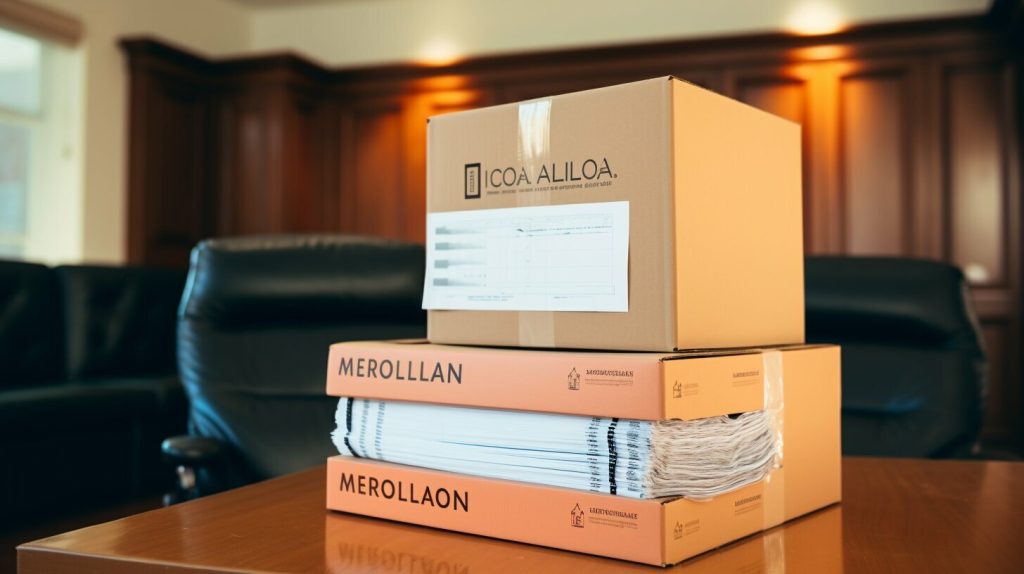Welcome to our article on managing moving-related legalities and contracts. If you’re planning a move, it’s important to understand the legal considerations and contractual obligations involved to ensure a smooth relocation. From contracts for moving services to the necessary legal documents for relocation, we’ve got you covered.
At Move It Right, we know that moving can be stressful, so we’re here to simplify the legal aspects of your move. Let’s dive into the key points you need to know to manage moving-related legalities and contracts.
Key Takeaways
- Understanding legal considerations and contractual obligations is vital for a smooth relocation.
- Legal guidelines and regulations in Canada must be considered before delving into specific moving contracts.
- Different types of moving contracts exist, each with its own set of contractual obligations.
- Legal documents are essential for a successful relocation, including moving contracts, insurance policies, and additional paperwork required by the province or municipality.
- Negotiating moving contracts and policies is crucial in protecting your rights and ensuring a satisfactory move.
Understanding Moving Laws and Regulations in Canada
In this section, we would like to provide you with an overview of the moving laws and regulations in Canada. As we mentioned earlier, it is essential to have a basic understanding of these regulations to ensure a fair and lawful moving process.
Legal Guidelines for Moving
When it comes to moving laws and contracts, there are legal guidelines that both the moving company and the customer must follow. These guidelines determine the rights and responsibilities of each party and help protect them from any potential legal disputes.
As a customer, you have the right to:
- Receive a written or electronic copy of your moving contract
- Be provided with a detailed list of charges for moving services
- Request that the moving company provides you with a copy of their insurance policy
- File a complaint with the Canadian Association of Movers in case of any issues during your move.
As a moving company, they have the responsibility to:
- Provide you with a written or electronic copy of your moving contract
- Inform you of any additional charges that may arise during your move
- Treat your belongings with respect and care
- Provide you with a copy of their insurance policy upon request
- Resolve any complaints quickly and efficiently.
By understanding these legal guidelines, you can ensure that your move is fair and legal for both parties.
Legal Aspects of Moving
Moving involves several legal aspects that you need to consider. Some of the critical legal aspects of moving include:
- Insurance Requirements: You will need to ensure that you have adequate insurance coverage for your belongings during your move. Your moving company may also offer additional insurance options.
- Liability Issues: If your belongings are damaged during the moving process, you need to understand who is liable for them. Ensure that you read the terms and conditions of your moving contract carefully.
- Local Regulations: Different provinces and municipalities may have specific regulations regarding moving, such as parking restrictions and noise ordinances. Ensure that you understand these regulations to avoid any legal issues.
Understanding these legal aspects of moving can help you protect yourself legally during your move and avoid any potential legal disputes.

In the next section, we will discuss different types of moving contracts and the contractual obligations associated with them.
Types of Moving Contracts
When it comes to moving, there are different types of contracts you may encounter. These contracts establish the rights and obligations of both parties and specify the terms of the moving service. Here are some of the most common moving contracts:
Binding Contracts
A binding contract is a fixed-price agreement that establishes the total cost of the move upfront, including all services and fees. This type of contract is legally binding and typically used for long-distance moves. Once you sign a binding contract, you are obliged to pay the amount specified, regardless of any additional services you may request.
Non-Binding Contracts
A non-binding contract is an estimate of the cost of the move, which may change depending on the actual weight of your belongings and other factors. This type of contract is not legally binding, and the final price may be higher than the estimated amount. It’s essential to read the contract carefully to understand the fees and charges that may be added to the final bill.
Guaranteed Not to Exceed Contracts
A guaranteed not to exceed contract is a hybrid between a binding and a non-binding contract. This agreement sets a maximum limit for the total cost of the move, but if the actual cost is lower than the estimate, you pay the lower amount. This contract provides customers with some protection against unexpected expenses and is typically used for long-distance moves.
It’s important to note that contracts can vary depending on the moving company, so it’s crucial to carefully read the terms and conditions of any agreement before signing. By doing so, you can ensure that you understand your contractual obligations and avoid any potential legal disputes.

Key Legal Considerations for Moving
When planning to move, it’s important to take into consideration the various legal aspects that may impact your relocation. Understanding these legal considerations can help you avoid any potential legal disputes. In this section, we will discuss some of the key legal considerations for moving.
Liability Issues
One of the significant legal aspects of moving is liability issues. It’s essential to understand who is responsible for any damage or loss of your belongings during the move. Typically, moving companies are liable for any damage or loss that occurs during the move. However, it’s important to read the contract thoroughly to ensure you understand the terms and conditions.
Insurance Requirements
Another legal consideration for moving is insurance. Depending on the type of move, you may need to purchase additional insurance to protect your belongings during the move. It’s crucial to discuss insurance requirements with your moving company and clarify any questions you may have. Having adequate insurance coverage can give you peace of mind and help protect your belongings.
Legal Documentation
Several legal documents are necessary during the moving process. These may include a bill of lading, inventory sheet, and contract with your moving company. It’s important to keep these documents safe, as they may be required to resolve any disputes that may arise during the move.
Contractual Obligations
When hiring a moving company, you will enter into a contractual relationship. It’s vital to understand your obligations and responsibilities under the contract. Ensure that you read the contract thoroughly and understand the terms and conditions, including any hidden fees or charges. If you have any questions or concerns about the contract, do not hesitate to ask the moving company for clarification.
By understanding these key legal considerations, you can make informed decisions and protect yourself legally during the moving process. Remember, Move It Right is here to provide expert advice and assistance with your moving-related legalities and contracts. Contact us at 1 (866) 558-8564 to speak with one of our experts.

Essential Legal Documents for Relocation
When it comes to moving, legal documents play a crucial role in ensuring a smooth and successful transition. As you plan your move, it’s essential to gather and prepare all the necessary legal documents.

Moving Contracts
A moving contract is a legal document that outlines the agreement between you and your moving company. It includes information such as the services provided, the cost of the move, and the timeline for completion. Make sure to read and understand the contract before signing it, and keep a copy for your records.
Insurance Policies
Insurance is an essential aspect of any move. It provides protection in case of loss or damage to your belongings during the move. Before you move, make sure to review your insurance policies and purchase any additional coverage you may need. Keep a copy of your insurance policy with you during the move.
Additional Paperwork
Depending on your destination and circumstances, there may be additional legal documents required for your move. For example, if you are moving to a new province or territory, you may need to update your driver’s license, vehicle registration, and health card. Research and prepare these documents well in advance to avoid any delays or complications.
By ensuring you have all the necessary legal documents for your move, you can eliminate any potential legal issues and ensure a seamless transition to your new home.
Negotiating Moving Contracts and Policies
When it comes to moving, negotiating the terms of the contract and policies with your moving company is a crucial step in protecting your rights and ensuring a satisfactory move. Here are some tips to help you navigate the negotiation process:
Read the Fine Print
Before signing any contract, be sure to read and understand the fine print. This includes any terms and conditions related to fees, liability, and insurance coverage. If you have any questions or concerns, don’t hesitate to ask your moving company for clarification.
Clarify Ambiguities
If there is any ambiguity in the contract language, it’s important to clarify it before signing. This can help avoid any potential misunderstandings or disputes down the road.
Determine Your Needs
Before negotiating with your moving company, determine your specific needs and expectations, such as the date of the move and any additional services required. Having a clear understanding of your needs can help ensure that the contract and policies meet your expectations.
Be Prepared to Negotiate
If you are not satisfied with the initial terms presented by your moving company, don’t be afraid to negotiate. Be prepared to present your concerns and offer suggestions for alternative terms. Keep in mind that negotiation is a two-way street, and both parties should work together to reach an agreement that is fair and reasonable.
Get It in Writing
Once you have negotiated and agreed upon the terms and policies, be sure to get everything in writing. This can help prevent any confusion or disputes in the future.
By following these tips, you can advocate for your interests and achieve a fair and favorable agreement for your moving contract and policies.

Legal Rights and Remedies for Moving Disputes
Despite our best efforts, disputes may arise during the moving process. As a customer, it’s crucial to understand your legal rights and the remedies available in case of conflicts with your moving company. When dealing with moving-related legalities and contracts, always remember to keep documentation of all correspondence, invoices, and receipts, as these can be incredibly valuable in case of a dispute.
If you believe that your moving company has breached its contractual obligations, you may have legal grounds for a remedy. Some potential legal remedies include:
- Terminating the contract and seeking damages for any losses incurred
- Seeking injunctive relief to prevent the moving company from taking further action that may harm your property or interests
- Filing a complaint with the Canadian Association of Movers or a consumer protection agency
- Taking legal action in small claims court or hiring a lawyer to represent you in a lawsuit
It’s important to note that legal remedies may vary depending on the specific circumstances of your case. Seeking legal advice from a qualified professional will help you determine your legal options and the best course of action for your particular situation.

At Move It Right, we understand the importance of protecting our clients from moving-related legalities and contracts. We are committed to ensuring transparency, fairness, and legality throughout the moving process. If you have any concerns or questions about the legal aspects of your move, don’t hesitate to reach out to us for expert advice and support.
Conclusion: Simplifying the Moving Legalities and Contracts
Managing the legal aspects of your move doesn’t have to be daunting. With our guidance, you can simplify the process and ensure a smooth relocation. Remember, understanding the legal guidelines for moving is essential in protecting your rights and ensuring a fair and lawful move.
One of the crucial steps in managing moving-related legalities and contracts is negotiating the terms of your moving contract and policies. By advocating for your interests and clarifying any ambiguities, you can achieve a satisfactory agreement that protects your rights and meets your needs.
Additionally, understanding the different types of moving contracts and their contractual obligations is vital to avoid any potential legal disputes during your move. By familiarizing yourself with these terms and conditions, you can be aware of your legal responsibilities and avoid any unpleasant surprises.
When it comes to legal considerations for moving, it’s important to be aware of the key factors that may affect your move. From insurance requirements to liability issues, understanding and preparing for these legal considerations in advance can help mitigate potential legal issues.
Relocating also requires specific legal documents to ensure a smooth transition. By preparing these essential legal documents, such as moving contracts, insurance policies, and additional paperwork required by your province or municipality, you can streamline the legal aspects of your move and avoid any unnecessary delays or complications.
Despite careful planning, disputes may arise during the moving process. Knowing your legal rights and the remedies available in case of conflicts with your moving company is crucial. By understanding the legal avenues for resolving disputes and seeking compensation, you can protect yourself and your interests.
At Move It Right, we are committed to simplifying your moving-related legalities and contracts, whether it’s for residential moving, commercial moving, or long distance moving. Contact us at 1 (866) 558-8564 for expert advice and assistance with your contracts for moving services and legal guidelines for moving. We’re here to support you every step of the way.
FAQ
What legal considerations should I keep in mind when moving?
When moving, it’s important to consider factors such as insurance requirements, liability issues, and any specific regulations in your province or municipality. These legal considerations will help protect you throughout the moving process.
What types of moving contracts are there?
There are different types of moving contracts, including binding and non-binding contracts. Understanding the terms and conditions of these contracts is crucial to avoid any potential legal disputes during your move.
What are the essential legal documents needed for relocation?
Essential legal documents for relocation include moving contracts, insurance policies, and any additional paperwork required by your province or municipality. These documents ensure a smooth transition and protect your interests legally.
How can I negotiate moving contracts and policies?
Negotiating the terms of your moving contract is important to protect your rights. We recommend understanding the fine print, clarifying any ambiguities, and advocating for your interests to achieve a fair and favorable agreement.
What are my legal rights and remedies in case of moving disputes?
In case of moving disputes, it’s crucial to understand your legal rights and the available remedies. We will discuss the legal avenues for resolving conflicts with your moving company and seeking compensation.
How can Move It Right assist with my moving-related legalities and contracts?
Move It Right is here to support you every step of the way. We provide expert advice and assistance with your moving-related legalities and contracts. Contact us at 1 (866) 558-8564 for personalized support and guidance.
